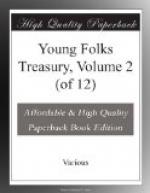And so she was obliged to stay where she was.
All this time the poor Muchie Rajah was hunting in every part of the country for his wife, but he could learn no tidings of her. For grief and sorrow at losing her he had gone almost distracted, and did nothing but wander from place to place, crying, “She is gone! she is gone!” Then, when he had long inquired without avail of all the people in her native village about her, he one day met a bangle-seller and said to him, “Whence do you come?” The bangle-seller answered, “I have just been selling bangles to some people who live in a Cobra’s hole in the river-bank.” “People! What people?” asked the Rajah. “Why,” answered the bangle-seller, “a woman and a child; the child is the most beautiful I ever saw. He is about three years old, and of course, running about, is always breaking his bangles and his mother buys him new ones every day.” “Do you know what the child’s name is?” said the Rajah. “Yes,” answered the bangle-seller carelessly, “for the lady always calls him her Muchie Lal.” “Ah,” thought the Muchie Rajah, “this must be my wife.” Then he said to him again, “Good bangle-seller, I would see these strange people of whom you speak; cannot you take me there?” “Not to-night,” replied the bangle-seller; “daylight has gone, and we should only frighten them; but I shall be going there again to-morrow, and then you may come too. Meanwhile, come and rest at my house for the night, for you look faint and weary.” The Rajah consented. Next morning, however, very early, he woke the bangle-seller, saying, “Pray let us go now and see the people you spoke about yesterday.” “Stay,” said the bangle-seller; “it is much too early. I never go till after breakfast.” So the Rajah had to wait till the bangle-seller was ready to go. At last they started off, and when they reached the Cobra’s hole the first thing the Rajah saw was a fine little boy playing with the young Cobras.
As the bangle-seller came along, jingling his bangles, a gentle voice from inside the hole called out, “Come here, my Muchie Lal, and try on your bangles.” Then the Muchie Rajah, kneeling down at the mouth of the hole, said, “Oh, lady, show your beautiful face to me.” At the sound of his voice the Ranee ran out, crying, “Husband, husband! have you found me again?” And she told him how her sister had tried to drown her, and how the good Cobra had saved her life and taken care of her and her child. Then he said, “And will you now come home with me?” And she told him how the Cobra would never let her go, and said, “I will first tell him of your coming; for he has been a father to me.” So she called out, “Father Cobra, father Cobra, my husband has come to fetch me; will you let me go?” “Yes,” he said, “if your husband has come to fetch you, you may go.” And his wife said, “Farewell, dear lady, we are loath to lose you, for we have loved you as a daughter.” And all the little Cobras were very sorrowful to think that they must lose their playfellow, the young Prince. Then the Cobra gave the Muchie Rajah and the Muchie Ranee and Muchie Lal all the most costly gifts he could find in his treasure-house; and so they went home, where they lived very happy ever after.




